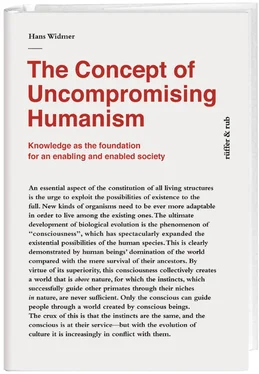Physics talks of electrical charge, although it cannot say what constitutes charge, but rather measures interactions; for these it assumes charge to be the underlying cause. Charge is a property of elementary particles and has no isolatable existence, just as acid is its acidic effect, the wall perceived by a bat is something it cannot penetrate, and a “house” is an expression of its sheltering function. The existence of human beings is what they cause and tolerate—not their biomass.
In abstract terms, “existence” means “to be in a state of interaction” . “Existence” grows from linguistic usage: it is said of an objectivised object, thus one that is separate from oneself, that it “exists”. The object is part of the inventory of the speaker’s world—what is actually being expressed is that the speaker has noticed the object. Existence, or the verb “to be”, can thus be replaced in the following sentences: berries are/glow red; schoolchildren are/sit in the classroom; two and two are/make four. The fact that something is or exists as a projection of the speaker is, like all verbal expressions, only justified by its usefulness.
Limits of knowledge
Those who want to conceive of reality must also consider their capacity for knowledge as part of objectifiable reality, beginning with the understanding that continuum, space and time are not part of the picture, are not reality, but the material and framework for forming it—sand and sandbox with which a model of the world can be built up.
The a priori intuitions should be accepted and not interpreted further. So why all the fuss about them? Because the framework they mark out for all philosophising cannot be transcended, even if the intention is to consider “outside” aspects. Philosophy was clearly too uncertain of the a priori intuitions to call Einstein back to the drawing board when he postulated the bending and expansion of space and the expansion of time. “Nature has given us the chessboard beyond which we cannot operate …”Goethe
Copernican turning points

Nicolaus Copernicus,
1473–1543
Ask a three-year-old who has a brother whether the latter also has a brother and he will answer no, there are only two of them. Not until a year later will he come to consider his relationship with his brother from the outside, thereby objectivising it. Small children also relate the rest of the world to themselves, for example, when they say the moon shines so they can find their way home. The cognitive development of the human race, as well as individuals, is characterised by increasingly letting go of a viewpoint defined by how the outside world affects us.
Animism in hunter-gatherer cultures projects intentions onto everything that happens in the world—clouds as an expression of the moods of the gods, these in turn being a response to human behaviour. The first turning point in intellectual history was initiated by the pre-Socratic philosophers (600–400 BC): they considered world events as something apart from divine intentions, and justified reality with reality, although spatially as well as spiritually people were still at the heart of things. This world view, to which Ptolemy (100–170 AD) put the final touches, held its ground and was supported by scholars for some 2000 years.

Giordano Bruno,
1548–1600
It was Copernicus who introduced the second turning point: the universe did not revolve around the Earth, but the Earth around the sun. His grounds for believing this were because it made it easier to understand the movement of celestial objects: “Any visible movement of the firmament with its fixed stars is not due to movement of the firmament, but as it is seen from the Earth ...” The Earth and the human race were thus shifted from the centre of all cause and purpose—a colossal attack on the word of God, the authority of the church and the understanding at that time of the self and the world. To begin with, Copernicus was not taken seriously by very many (Luther considered him a fool), but then, sixty years after the publication of his work, Giordano Bruno was burnt at the stake for making the same statements.
In 1905, Einstein’s theory of relativity introduced a third turning point, although this upset the a priori intuitions. It does not show that physics is thought out within the limits of human cognitive capability; nor does it show that it is a collection of abstract concepts and principles to explain the aspects phenomena have in common.
It has always been apparent contradictions that have led to new findings, in particular to a higher plane of objectivisation:
–Copernicus asked: “Why do the planets not move in the same way as the other celestial objects?”,
–Einstein asked: “Why does light arrive at c , when it would be expected to have been emitted at c + v ?” (where c is the speed of light, and v is the approach velocity of the emitting light source),
–In deductive physics the equivalent would be, “If the a priori intuitions are an immutable part of the thought process, how can the results of the theory of relativity be brought into harmony with one another?”
2
Matter from the void:
dynamics of the logically essential continuum
In order to gain an idea of the world, the human brain provides the a priori intuitions as the coordinate system (like a box) and a continuum within it (like the sand in this box). The task of physics should now be to represent the material world from the elementary particles to the universe using this “sandbox”. It is a long way from achieving this, as its two completed theories comprise 75 laws and constants, and those that are still partially incomplete well over one hundred. Despite this plethora of laws and constants, the starting point for all physics—inertia and gravity—remain unexplained; its four major theories do not interconnect, as it proceeds on the basis of phenomena, measures correlations in experiments and uses these to produce laws; in other words, it proceeds inductively. Whenever phenomena appear that are not explained by the existing laws, it adopts new concepts, thus increasing the number of independent laws and constants. It countered this tendency with a constant striving for unification (the “Theory of Everything”, “Grand Unification”, etc.)—since the pre-Socratic philosophers it has been expected that the world has a single, comprehensive explanation.
Despite all its triumphs, inductive physics1 has reached a crisis point, and significant thinkers criticise its tendencies towards the esoteric, to the extent that the Higgs boson could be said to be the carpet beneath which all contradictions are swept. String Theory, in particular, has met with scepticism and even scorn—“Not even wrong”.Woit The epilogues of textbooks often contain speculation as to the need for a totally “unexpected approach” in elementary particle physics, implying that “more of the same” would be unlikely to move things forward. Instead of “bringing down the concepts of space and time from the Olympus of the a priori”, as proclaimed by Einstein in 1921, it now appears that philosophy will have to take up the task of bringing down physics from the Olympus of the inconceivable.
The starting point of deductive physics
What all the concepts and principles of physics have in common is that they are located in the realms of human understanding. In his “Critique of Pure Reason” (1781), Kant stated that anyone who wants to understand the world must first explain what understanding means. The theory of relativity incorporates the movement of the observer in its laws, and quantum mechanics the effect of the observer, but they nevertheless perceive themselves to be uninvolved witnesses of an objective world.
Читать дальше














